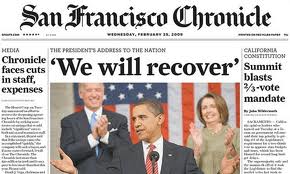CA’s Democrats in Congress Wake Up to Need to Address Foreclosures
 Well, that’s a pretty safe statement, but when?
Well, that’s a pretty safe statement, but when?
The San Francisco Chronicle is at least beginning to wake up to the fact that foreclosures are quite the problem in California. Yesterday, on page A-13, appeared the headline: “Foreclosure relief is key to economic recovery,” thus making me into a monkey’s uncle as promised.
It’s kind of funny, because it’s an editorial that’s not written by anybody specific, lest it offend I suppose, but it kicks off sounding like it could have been written by me… back in 2008… if I was trying not to scare anyone too much. But no worries… better 3-4 years late to a party than never showing up at all… I guess. Here’s how it opens…
“No economic recovery will take hold without serious attention paid to home foreclosures. Consumer spending, the job-heavy construction industry and bank stability hang in the balance.”
Of course, economics is one of those knee-bone-connected-to-the-ankle-bone sort of subjects, so would anyone like me to explain what hangs in the balance once consumer spending, construction jobs, and bank stability are achieved? Hmmm… I don’t want to get too technical here… oh wait, I know… how about: EVERYTHING ELSE.
Apparently, this past week, the sound of the economy’s ship going down must have awoken the majority of House Democrats from California who then just jumped all over the Obama Administration for “failing to deliver on promises to curb foreclosures.”
The Chronicle said the California Dems frustration was over “banks’ recalcitrance and the White House’s timidity to act.”
The bank’s recalcitrance? Gee, that sounds awfully harsh… I would have gone with the “bank’s obduracy.” Yeah, that really says it better, don’t you think? Much stronger. I mean, if you’re going to go after the banks for their behavior, why mince words? I don’t know about you, but when I’ve got someone rubbing my nose in poo, I don’t cower or retreat, I don’t beat around the bush either… I come right out and call them “obdurate,” as I’m sure you would as well.
Recalcitrance sounds like a health drink my grandmother used to require once a day… “Time for my daily recalcitrance, Martin… boil the water, would you be a dear?” Want a synonym for “recalcitrance?” How about: disobedience, insubordination, mutiny, noncooperation, resistance, defiance… any of those working any better for you? Well, I’m glad I could help.
As to the White House’s “timidity,” well, heck… it’s become legendary. Just so you have some idea of just how timid he is in my mind… I was having this dream the other night. I was in a bar in Chicago and all of a sudden Barack and Michelle Obama come walking in… he’s not the president or anything, just a regular couple from Chicago. So, next thing that happens we get into a heated argument, and I can’t recall what it was about exactly but he was getting all mouthy… so, I slugged Michelle right in the mouth.
(I’m kidding, Mr. Secret Service Man, I’m a kidder… ask anyone… I kid.)
Besides, in my dream I just yelled, “SCAT!” real loud, and he ran to his car and took off. Then Michelle and I had a few drinks and ended up going back to my hotel room, and… well, never mind about that.
(Kidding again… really, I’m just kidding.)
The San Francisco Chronicle says that “the president has thrown the kitchen sink at the country’s sagging economy,” and I have to admit that I did not know that. The newspaper says he’s also thrown “a stimulus package, a bank bailout plan and tax relief,” and I’d heard about those, but the kitchen sink thing was news to me.
Just as seems to be the case with every other media outlet, politician, and administration staffer in the country, the Chronicle seemed surprised that after the stimulus, the bank bailout plan and whatever tax relief the S.F. paper is talking about, “the nation’s financial pulse hasn’t picked up.”
Why do people think those things lead to the picking up of our national pulse? I mean, someone needs to walk me through the thinking in play there… real slow, because I’m not getting it.
I mean, the bank bailout plan couldn’t make the economy recover, because for an economy to recover, money has to actually go into it, not just into the pockets of 13 bankers. And the stimulus spending did help the economy in some ways, it’s just that when you’re in a hole 1,000 feet deep, and someone throws you down a12-foot ladder, you don’t exactly pop out at the top.
So, the Chronicle’s anonymous editorial writer for some reason has now reached the conclusion that the economy “won’t get better without a thorough response to home foreclosures.”
Perhaps the Chronicle was responding to the new numbers included in the editorial, which indicate that 2.2 million homeowners in California are “underwater.” Also mentioned was that on top ten list of cities with the most foreclosures, eight are in California… and a couple years back there were only five on that list, points out the Chronicle’s editorial.
I don’t understand how those two statistics could make the newspaper do something it hasn’t done in the last three years since the crisis began… you know, come right out and say that it’s fix foreclosures or we’re done… after all, those number aren’t even the worst ones I could throw at them.
The Chronicle does point out that the administration couldn’t even get an insipid little jobs bill passed, and it contained tax cuts, which are normally like red meat to Republicans. They say the president “faces a near-impossible challenge in winning bipartisan support.“ Near ““impossible? Okay, as in it would be “near-impossible” for me to get Donald Trump to shine my shoes for the next year during primetime, that kind of near-impossible?
The newspaper says that the White House should instead “use its administrative muscle to tap banking and consumer regulations on the books.” And I have no idea what that means, but it’s okay, I’m fine with that… tap away, by all means.
The newspaper then seems to say that by tapping regulations on the books, as described above, there will be changes that will allow people to get new loans. Here’s the paragraph in its entirety:
“This reality should lead the White House to use its administrative muscle to tap banking and consumer regulations on the books. These changes include allowing jeopardized homeowners to obtain new loans – now at historically low rates in the 4 percent range – to replace older, budget-crushing mortgages. This change alone would keep more families in their homes and give households extra cash to spend, multiplying the benefits.”
Now, I really haven’t the foggiest idea of what they’re talking about, but if it has anything to do with the president’s “new” refinancing initiative, and I’m pretty sure it does… then it won’t work, isn’t working, and never had a shot at working. It’s a stupid idea that’s proof positive that no one involved knows what their doing.
When Obama announced the Making Home Affordable program in February of 2009, there were two components: HAMP and HARP. HAMP is the Home Affordable Modification Program and HARP is the Home Affordable Refinancing Program. Neither has come anywhere close to reaching its intended objectives, nor has either made any significant contribution to mitigating the damage being caused by foreclosures.
HARP was not designed to have anything to do with foreclosures, it’s purely a refinancing program that was to put extra cash in someone’s pocket in the hopes that the money will be spent, thus stimulating the economy. Even if the program were to have worked flawlessly as designed, its capacity to help the economy would be limited… and by limited I do mean miniscule.
HARP was designed to allow someone to refinance their mortgage even though they didn’t have adequate equity for a conventional loan. If memory serves, initially a borrower could owe 115% of their home’s value, and some months after that they increased it to 125%, I believe. All of this was fine for a very small number of homeowners, certainly not those that were more seriously underwater, and none were at risk of foreclosure.
Since then, rates have remained low, so those that could refinance have refinanced. Trying to create a program that attempts to allow further refinancing in order to stimulate the economy is going to be about as effective as removing sand from the beach with a teaspoon. The fact that President Obama even brought up the idea during his last speech on job creation is evidence that the administration simply doesn’t know what to do about foreclosures.
So, let me be very clear about this in the hopes that the Chronicle will learn something:
1. If by “jeopardized homeowners,” you mean those at risk of foreclosure, then they cannot refinance. They’re too far underwater and don’t have anywhere near the credit score required to so, even if they were not as far underwater.
2. The people that have “budget-crushing mortgages” can’t refinance… period. They’re the ones that we’ve been screwing around with for the last two years over loan modifications.
3. And even if you’re talking about the small number of homeowners that do still have equity and would qualify for a loan, there are nowhere enough of them to stimulate Santa Cruz, and the ones there are have already refi’d at low rates so their potential cash savings is going to be too small to affect anything.
The Chronicle does admit that banks have been treating homeowners applying for loan modifications “roughly by losing documents, demanding endless paperwork and rejecting good-faith loan requests.”
Well, the banks have been doing a whole heck of a lot more than that to homeowners applying for loan modifications, but at least it’s a start. The Chronicle does have four words to say about the subject: “These abuses should stop.”
Oooh, snap! Now, that’s really sticking it too them. No wonder the editorial was anonymous.
Lastly, the newspaper brings up the idea of reducing the balance owed by the borrower, and acknowledges that it’s not an idea favored by the banks. But the writer of the editorial says that if the bank can’t collect it “kicks the loan to federal guarantee agencies such as Fannie Mae or Freddie Mac. That means taxpayers foot the bill.”
I know… it’s not always the case, but leave them alone, they’re on a roll.
Here’s how the Chronicle takes on the 800-pound gorilla that’s been in the room all along:
“For many homeowners not swept up in the housing and loan bubble of four years ago, it’s easy to blame the problem on profligate banks or irresponsible homebuyers. Why worry about these people?
Here’s why: The country’s economic problems won’t get better without a serious plan to clean up the foreclosure mess. Taxpayers will stay on the hook for ever greater bills as property taxes drop away, weak banks hold back on new loans, and federal agencies are stuck with the bill.”
One Question: Is it “easy to blame the problem on irresponsible homebuyers?” Or is it stupid to blame the problem on irresponsible homebuyers. Well, I suppose it’s both. It’s “easy,” because learning about what actually happened to cause the foreclosure crisis does take some time and effort, so I guess it is comparatively easy to remain ignorant.
By the way, if you still think that the foreclosure crisis was the fault of irresponsible homeowners, you might try this on for size: Think it was the borrowers? Think again. And there’s lots more where that came from.
Conclusion…
Look, it’s great to see the San Francisco Chronicle coming around to understanding the situation… but I have to say that it wasn’t unexpected. During the early years of the Great Depression, newspaper editorials were very similar to those seen during the last three years. It’s interesting to note that back then the press didn’t start understanding the nature of the economic crisis until right around 1932.
Until then, most believed that recovery was only a year or two away at most. In 1930 and 1931, according to accounts of Benjamin Roth in his “Great Depression Diary,” several article headlines in the Chicago Tribune proclaimed that “now was a good time to buy.”
And as far as placing the blame for the economic crisis of the 1930s on the bankers, well that didn’t happen right away either. It wasn’t until 1933, five years into the Great Depression that the Senate committee hearings, led by Ferdinand Pecora probed the causes of the Wall Street Crash of 1929, and resulted in the major reforms to our nation’s financial system.
So, maybe the San Francisco Chronicle isn’t late to foreclosure crisis after all. Maybe it just takes the time it takes for societies to come to terms with what’s happening during times of great change and economic upheaval.
If you’ve been with me for a while now, reading me as I bang the drum to stop foreclosures while I’ve banged my head against the proverbial wall, then I’m here to tell you that now isn’t the time to give up or slow down, now is the time to turn up the volume, work with the states to help design solutions that will bring an end to the crisis.
Because the Chronicle is correct in its assertion that: “No economic recovery will take hold without serious attention paid to home foreclosures.”
In fact, now that I think about it, I could not have said it any better myself.
Mandelman out.






